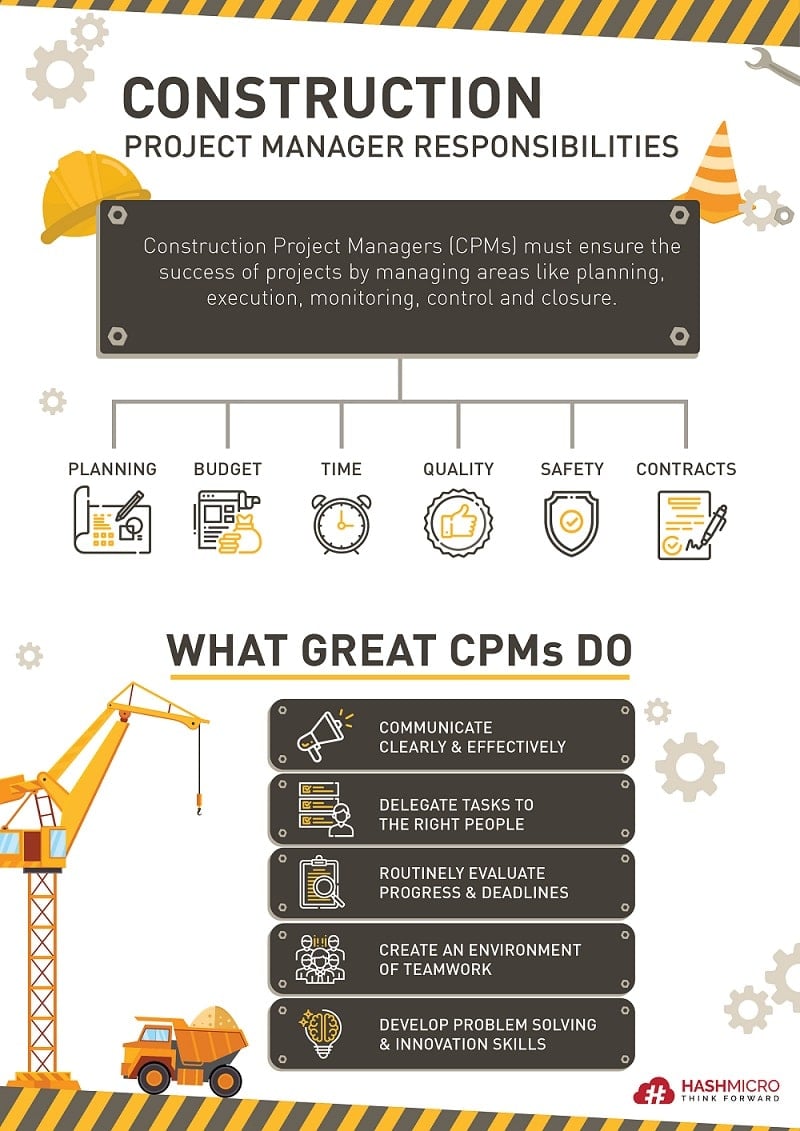Construction management involves many processes and requirements. It is the foundation for every building project as well as the key to its success. The main goal of construction management is to sharply control and monitor the progress of a project in terms of quality, cost, and time. It covers a wide spectrum of responsibilities and spreads to various sectors (residential, agricultural, institutional, industrial, etc.).
The role of a construction manager is critical to ensure the success of a project. Since planning in a construction project constantly changes, a great team leader who can maintain stability and facilitate coordination between team members is highly required. However, many other factors also have a large impact on the success of a construction project. Because of the importance of this work, you must be careful when doing the work. To avoid human error when managing construction, you should use construction software to control a project. With this software, you can also increase the efficiency of a construction project, inventory, employee, and client management in a centralized system.
Without further ado, let’s find out have a close look at the processes and principles of construction management. It’s going to be a long, but very informative journey!
To make it easier for you to understand this guide, see the following table of contents.
Table of Content:
Table of Content
Duties & Responsibilities of a Construction Project Manager
Simply put, construction managers are the people responsible for the project to run according to plan. The main mission of a construction manager is to ensure the completion of the project based on the agreed budget and time. In addition, they must ensure that all projects comply with building regulations.
A construction manager has many responsibilities during the construction project implementation, which can be divided into the following categories:
- Setting the budget and analyzing costs
- Planning the work time schedule
- Choosing the right construction methods and strategies
- Maintaining a good relationship with clients
- Negotiating contractual agreements with workers and project agents
- Taking care of workers on site
- Working together with different project consultants
The Role of a General Contractor
A construction manager must be prepared to look for a contractor once the design stage is complete. General contractors are responsible for the following:
- Becoming the backbone of the project
- Coordination of the trades
- Resource allocation
- Troubleshooting when problems arise
There are two types of general contractors; those who carry out the task based on the vision of architects and designers, and those who are responsible for implementing and designing the project. So, it is clear that general contractors play a key role during the building process and they have different responsibilities depending on their involvement during the project design stage.
The Key Functions of Construction Management
Every construction project has specific objectives that need to be achieved. Often, these goals overlap. In such cases, construction managers need to implement the right strategies. They must be able to provide clarity to all stakeholders as well as prevent disputes that could hamper the smooth running of the project.
With that in mind, we could summarize the main functions of construction management:
- Clearly defining project objectives and scope, including scheduling, setting performance standards, budgeting, and selecting project workers
- Improving resource allocation by refining the equipment management and procurement process
- Carrying out operational tasks as a result of effective coordination and monitoring of the entire process (for example design, contract management, planning, etc.)
- Building strong communication channels to avoid or resolve project conflicts
How to Win a Construction Project
The bidding process can be long and challenging. The parameter that can affect the difficulty of the bidding process is the total number of contractors who bid for the job. A bidding process starts when the project owner shares information about the project with contractors and subcontractors in an attempt to get a quote.
First things first, the cost is estimated based on the design. Thus, the client can have a picture of the budget that will be needed by the general contractor to carry out the project. Further more are two types of bids that contractors can anticipate:
Open bid: Usually attracts more attention and also very common in terms of public construction projects. In open bid projects, each contractor has the opportunity to submit a bid.
Closed bid: Commonly used in private projects. In this case, the client (the project owner) can invite a particular contracting team to place their offer.
After the project owner receives all bids, they will usually pick a winner based on three things; price, value (benefits), and qualifications. Then, after selecting a contractor, both parties (the client and the contractor) must find a payment model that suits their project. Some payment models to choose from are:
Lump-Sum Contract: The number one choice in most construction projects. The client agrees with the contractor on a set price and pays it in advance regardless of the results of the project.
Unit price: When the client and contractor disagree on a specific price, a unit price is determined for each stage of the project.
Cost-plus fee: This is profitable for contractors. In this case, the client is the person who has to bear additional costs during the building process.
Stages of Construction Management
After the bidding and contract signing process is complete, the construction project can begin. Construction project management is very different from other types of project management. However, there are some principles that they have in common. A construction project usually consists of five stages:
1. Initiation
Before the project starts, the construction manager must create a project feasibility report and submit it to stakeholders to determine whether they can proceed with the plan. If everyone agrees, the construction manager must collect project initiation documents that cover the scope and business needs.
2. Planning
This is the stage where the project manager builds a plan that includes information on several important aspects of the project, such as workflow and cost estimations. Planning is a long process that never ends until the project is finished because there are always changes. Therefore to automate your business processes from planning to human resource management, you can use ERP software to make the process more efficient.
3. Execution
This is where the construction project implementation actually begins. This stage usually consists of two processes; project implementation and process control or monitoring. During this phase, the project team continuously ensures that all tasks run as they should. Meetings are held regularly to comply with every aspect of the construction process.
4. Monitoring
The construction manager dedicates most of his time to supervising the project and adjusting its schedule to the changes and problems that arise. The goal of doing this is to maintain control of the project.
5. Closure
This stage represents the completion and delivery of the project. At this point, the construction manager reviews whether the project has met the initial objectives and whether it was completed based on the initial budget estimations. Then, the manager compiles a report that presents the final results of the project, which can be a valuable source of knowledge for future construction projects.
How to Optimize Construction Project Scheduling
You have to complete the project on time, otherwise, there will be a cost overrun and you will put your project team under extreme pressure. This is why construction projects need digital solutions that provide complete visibility throughout the entire supply chain also allow project stakeholders to monitor every detail.
Here are the four basic components of scheduling in construction management:
1. Real-time task allocation
Creating, assigning, and prioritizing tasks in real-time during the construction project is mandatory. That way, you resolve all problem on time and avoid costly downtime.
2. Online progress monitoring
The digitalization of the construction industry is progressing and scheduling is an important part of it. Monitoring progress online and in real-time with Project Management System can help you accelerate the project progress and shorten the cycle. Automated project management system can help do this.
3. Share the schedule with workers
After the assignment is given and a clear plan has been established, it is time to communicate all of this to all the workers involved. Through reliable project management software, this can be done in real-time, enabling the team to coordinate their next steps faster and seamlessly.
4. Get subcontractors notified on mobile
One of the most common problems that often occur in construction management is the lack of trust throughout the supply chain. As a result, subcontractors end up delaying their work for fear that the previous subcontractors did not complete their work on time. This could lead to significant project delays and the abandonment of the construction site for weeks before the next task begins.
This is where the role of an automated solution becomes highly necessary. A centralized construction software allows all parties, including subcontractors, to monitor the progress of various tasks using their mobile phones. This can bring back and increase trust among different project stakeholders.

{
“@context”: “https://schema.org”,
“@type”: “FAQPage”,
“mainEntity”: [{
“@type”: “Question”,
“name”: “what is open bid ?”,
“acceptedAnswer”: {
“@type”: “Answer”,
“text”: “Usually attracts more attention and also very common in terms of public construction projects. In open bid projects, each contractor has the opportunity to submit a bid.”
}
},{
“@type”: “Question”,
“name”: “what is close bid ?”,
“acceptedAnswer”: {
“@type”: “Answer”,
“text”: “Commonly used in private projects. In this case, the client (the project owner) can invite a particular contracting team to place their offer.”
}
}]
}



































